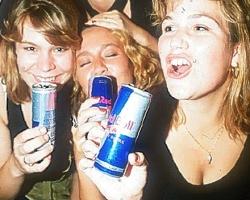Schoolchildren have been showing signs of caffeine addiction after consuming energy drinks such as Red Bull, health campaigners have cautioned.
Bob Tait of Drugs Education UK told a conference of school nurses that caffeine intake–from energy drinks and tablets–is an increasing problem in schools.
Drinks such as Red Bull are cheap and easily available, he said. “Children will drink them on the walk to school, at break and lunch time. If you have got a child who is worked up on an energy drink, they are going to be agitated during lesson time.”
He warned nurses to look out for pupils complaining of chest pains, headaches, restlessness or sleeplessness, Nursing Standard magazine reports.
“If pupils are feeling unwell they are likely to go and see the school nurse. If they come to you with these complaints, be aware that there may be a caffeine problem at the bottom of it.”
Caffeine-rich drinks containing up to 160mg of caffeine per can, and tablets containing 50mg of caffeine per tablet, are said to combat tiredness, improve performance and boost concentration.
Red Bull already carries health warnings advising customers not to drink more two cans a day.
Discussion Starters
1.) Adolescents typically require more sleep than they did as children. Are you finding members of your group responding to that need with caffeinated beverages or tablets? What alternatives would you suggest, or how would you advise they allocate their time so they get the rest they need and still be able to do all they need and want to do?
2.) Foods and beverages frequently are found to cause significant health concerns in humans. Are energy drinks contributing to concentration issues among the youth with whom you work? Have energy drinks, sodas and/or caffeine consumption contributed to health issues among your students?
3.) Tait says caffeine leads students to become agitated during lesson time. Children and adolescents often bore easily anyway. How are you combatting or dealing with their caffeine intake?




